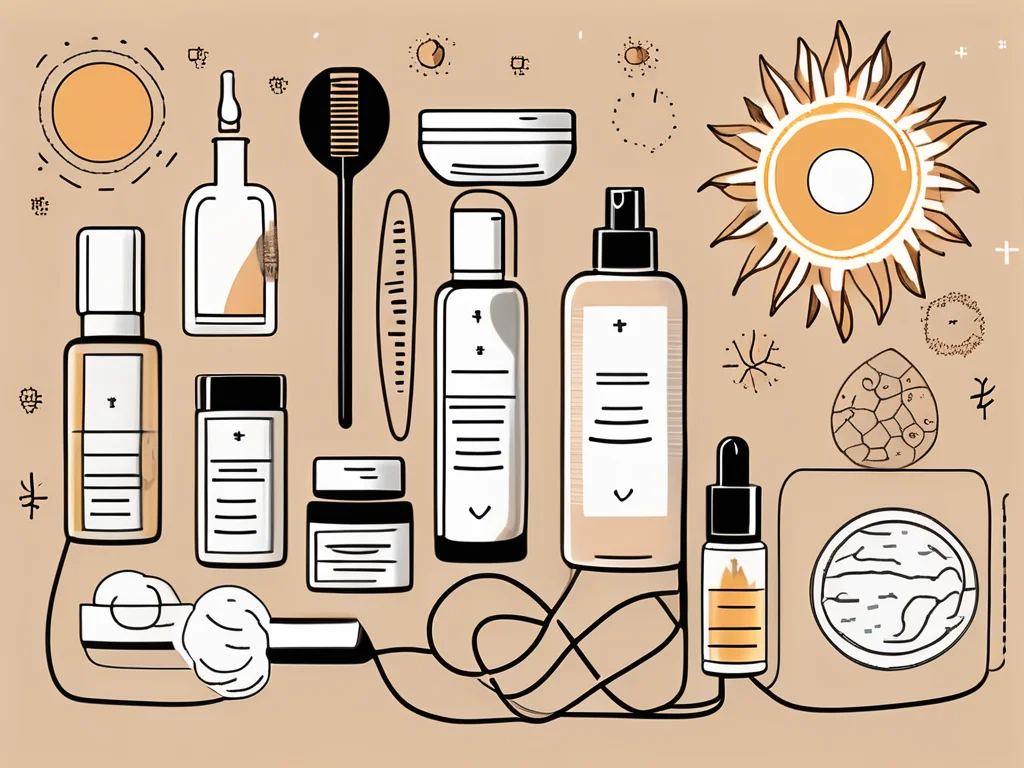Oily skin can be a challenge, with excess sebum leading to clogged pores, acne, and a shiny complexion. However, with a tailored skincare routine, you can manage oil production and achieve healthy, balanced skin. This guide outlines a comprehensive oily skin care routine, covering cleansing, moisturizing, exfoliation, treatments, and more. By understanding your skin’s unique needs and using targeted products, you can control oiliness, reduce breakouts, and maintain a radiant complexion.
Understanding Oily Skin: Causes and Characteristics
What Is Oily Skin?
Oily skin results from overactive sebaceous glands producing excess sebum, the skin’s natural oil. This leads to a greasy appearance, particularly in the T-zone (forehead, nose, and chin), and increases the likelihood of acne, blackheads, and enlarged pores. While sebum protects and hydrates the skin, too much can cause issues.
Why Does Oily Skin Occur?
Several factors contribute to oily skin:
- Genetics: Some people are predisposed to higher sebum production.
- Hormonal Fluctuations: Puberty, pregnancy, or menopause can increase oil production.
- Environmental Factors: Heat and humidity can stimulate sebaceous glands.
- Lifestyle Choices: Diet, stress, and improper skincare can exacerbate oiliness.
Understanding these triggers helps you tailor a routine to manage oily skin effectively.
Common Signs of Oily Skin
- Shiny or greasy appearance, especially in the T-zone.
- Enlarged pores, particularly on the nose and cheeks.
- Frequent acne breakouts, including pimples, blackheads, and whiteheads.
- Skin that feels oily to the touch, often requiring multiple cleansings daily.
Why a Customized Oily Skin Care Routine Matters
The Limitations of Generic Skincare
Generic skincare routines often fail to address the specific needs of oily skin. Products designed for all skin types may be too heavy or comedogenic (pore-clogging), worsening oiliness and acne. A personalized routine targets excess sebum, unclogs pores, and balances hydration without adding grease.
Benefits of a Tailored Routine
A customized routine:
- Regulates sebum production for a matte finish.
- Reduces acne and blackheads by keeping pores clear.
- Addresses coexisting concerns like dehydration or sensitivity.
- Adapts to external factors like climate or hormonal changes.
By focusing on your skin’s unique needs, you can achieve a healthier, more balanced complexion.
Step-by-Step Oily Skin Care Routine
1. Cleansing: The Foundation of Oily Skin Care
Why It’s Important: Cleansing removes excess oil, dirt, and impurities, preventing clogged pores and breakouts. For oily skin, proper cleansing creates a clean base for other products to work effectively.
How to Cleanse Oily Skin:
- Use a gentle, oil-free cleanser formulated for oily or acne-prone skin.
- Look for ingredients like salicylic acid or tea tree oil to unclog pores and reduce inflammation.
- Cleanse twice daily—morning and night—to control oil without stripping the skin.
- Avoid harsh scrubs or cleansers that over-dry, as they can trigger more oil production.
- Use lukewarm water to rinse, as hot water can stimulate oil glands.
Pro Tip: Double cleansing at night (using a cleansing oil followed by a foaming cleanser) can effectively remove makeup, sunscreen, and excess sebum.
2. Exfoliation: Keeping Pores Clear
Why It’s Important: Exfoliation removes dead skin cells that can mix with sebum and clog pores, leading to breakouts. Regular exfoliation promotes smoother, clearer skin.
How to Exfoliate Oily Skin:
- Exfoliate 2–3 times per week to avoid over-irritation.
- Choose chemical exfoliants with salicylic acid or glycolic acid over physical scrubs, which can be too abrasive.
- Salicylic acid penetrates pores to dissolve oil and debris, while glycolic acid smooths skin texture.
- Follow with a hydrating toner to restore the skin’s pH balance.
Pro Tip: Over-exfoliation can strip the skin and increase oil production, so monitor your skin’s response and adjust frequency as needed.
3. Toning: Balancing and Prepping the Skin
Why It’s Important: Toners remove residual cleanser, tighten pores, and prepare the skin for serums and moisturizers. They also help control oil and reduce shine.
How to Tone Oily Skin:
- Choose alcohol-free toners to avoid drying out the skin.
- Look for ingredients like witch hazel, niacinamide, or green tea extract to soothe and control oil.
- Apply with a cotton pad or clean hands, focusing on the T-zone.
Pro Tip: A toner with niacinamide can reduce sebum production and minimize pore appearance over time.
4. Moisturizing: Hydration Without Greasiness
Why It’s Important: Even oily skin needs hydration to maintain a healthy barrier. Skipping moisturizer can lead to dehydration, causing the skin to produce more oil to compensate.
How to Moisturize Oily Skin:
- Use lightweight, non-comedogenic moisturizers (gel or water-based formulas).
- Look for ingredients like hyaluronic acid for hydration or niacinamide for oil control.
- Apply a small amount after toner to lock in moisture without clogging pores.
Pro Tip: Opt for a mattifying moisturizer during the day to reduce shine.
5. Sun Protection: Shielding Oily Skin
Why It’s Important: UV rays can worsen oiliness and cause long-term damage like hyperpigmentation or premature aging. Sunscreen is non-negotiable, even for oily skin.
How to Protect Oily Skin:
- Choose a broad-spectrum SPF 30 or higher, formulated for oily skin.
- Opt for gel-based or mattifying sunscreens to avoid a greasy feel.
- Reapply every 2–3 hours if exposed to sunlight for extended periods.
Pro Tip: Look for sunscreens with zinc oxide or titanium dioxide, which offer physical protection without clogging pores.
6. Treatments and Masks: Targeting Specific Concerns
Why It’s Important: Treatments like serums and masks address acne, oil control, and other concerns like uneven texture or redness.
How to Treat Oily Skin:
- Use serums with retinol (for nighttime) to promote cell turnover and reduce acne.
- Incorporate clay masks (e.g., kaolin or bentonite) 1–2 times per week to absorb excess oil and detoxify pores.
- Spot-treat acne with benzoyl peroxide or salicylic acid to reduce inflammation.
Pro Tip: Apply treatments sparingly to avoid irritation, and always follow with a moisturizer to balance the skin.
Key Ingredients for Oily Skin
Ingredients to Include
- Salicylic Acid: Unclogs pores and reduces acne.
- Niacinamide: Controls oil and minimizes pores.
- Tea Tree Oil: Fights acne-causing bacteria and soothes inflammation.
- Hyaluronic Acid: Hydrates without adding oil.
- Retinol: Promotes cell turnover and prevents clogged pores.
Ingredients to Avoid
- Heavy Oils: Coconut oil or mineral oil can clog pores.
- Alcohol-Based Products: These strip the skin, triggering more oil production.
- Comedogenic Ingredients: Check labels for pore-clogging ingredients like lanolin.
Lifestyle Tips for Managing Oily Skin
- Diet: Eat a balanced diet rich in antioxidants (fruits, vegetables) and low in processed foods to support skin health.
- Hydration: Drink plenty of water to maintain skin hydration and reduce oiliness.
- Stress Management: Practice stress-relief techniques like yoga or meditation, as stress can increase sebum production.
- Clean Tools: Regularly clean makeup brushes and pillowcases to prevent oil and bacteria buildup.
When to See a Dermatologist
If your oily skin care routine doesn’t reduce acne, blackheads, or excessive oiliness after 6–8 weeks, consult a dermatologist. They can:
- Prescribe stronger treatments like retinoids or oral medications.
- Assess underlying issues like hormonal imbalances.
- Recommend professional treatments like chemical peels or laser therapy.
Conclusion
Managing oily skin requires a targeted, consistent routine that balances oil production, prevents breakouts, and maintains hydration. By incorporating gentle cleansing, strategic exfoliation, lightweight moisturizing, and sun protection, you can achieve a healthy, matte complexion. Pair your routine with the right ingredients—like salicylic acid and niacinamide—and lifestyle adjustments for optimal results. If challenges persist, a dermatologist can provide personalized solutions. With dedication, your oily skin can become a strength, glowing with health and balance.



